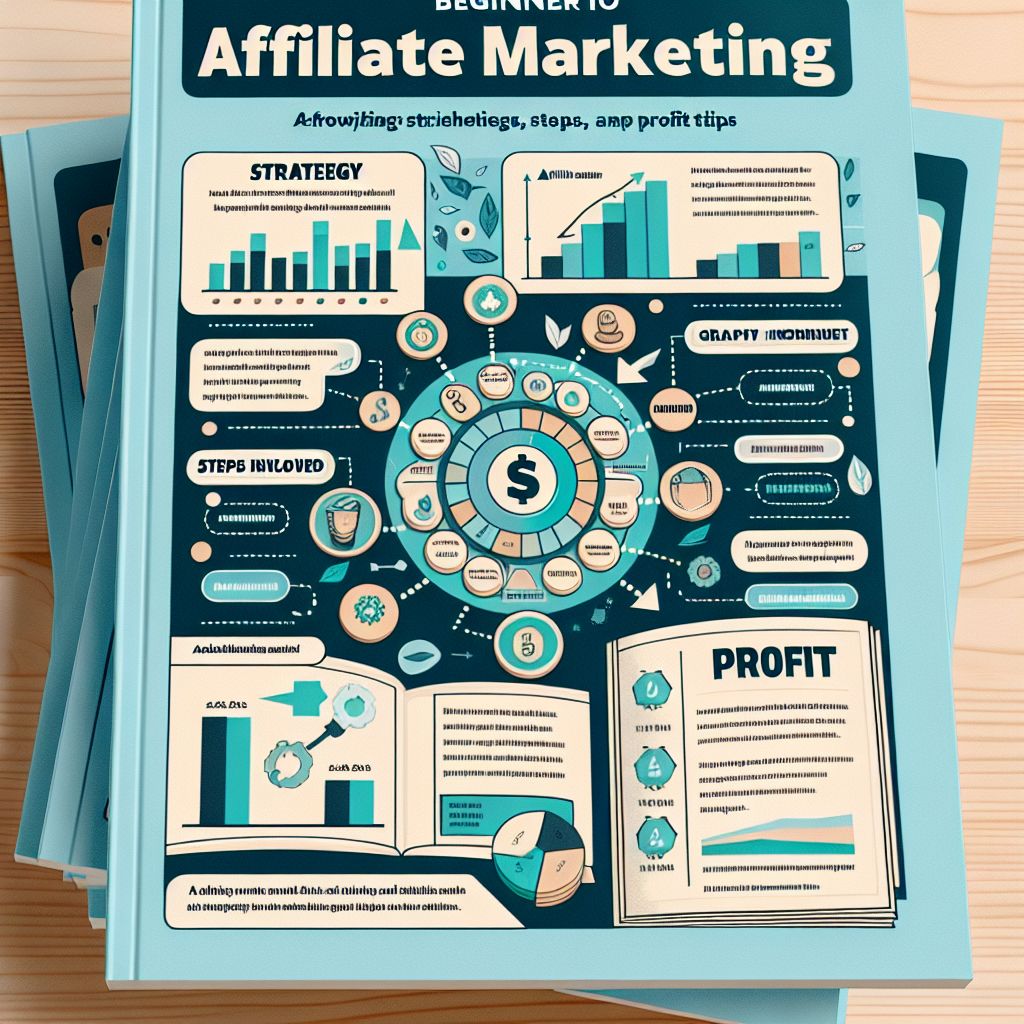Key Takeaways: Mastering Affiliate Marketing
- Affiliate marketing is a performance-based system where affiliates earn commissions for promoting products or services.
- Choosing a niche aligned with your interests and market demand is crucial for long-term success.
- Opting for the right affiliate programs and products is essential to maximize earnings.
- Content creation and SEO are fundamental to driving traffic and engaging your audience.
- Understanding different affiliate marketing channels helps you diversify your promotional strategies.
Dive Into Affiliate Marketing Essentials
Imagine you’re recommending your favorite book to a friend, and you get paid every time someone buys it based on your suggestion. That’s affiliate marketing in a nutshell. It’s a fantastic way to make money online by promoting products or services you believe in. As you embark on this journey, let’s clarify some basics and set you up for success.
What Is Affiliate Marketing and How Does It Work?
Affiliate marketing is like being a commission-based salesperson for the internet. You find a product you like, promote it to others, and earn a piece of the profit for each sale that you make. But instead of being in a physical store, you’re working through your digital platforms.
Here’s the simple breakdown:
- Merchants: These are the companies that create products or services. They need help reaching customers.
- Affiliates: That’s you! You promote these products or services. When someone buys through your unique affiliate link, you get paid.
- Customers: These are the people who buy the products through your affiliate links. Their purchases are tracked via affiliate programs.
And that’s the cycle of affiliate marketing. You help merchants, delight customers, and in turn, you earn income. It’s a win-win-win!
Decoding The Relationship Between Affiliates and Merchants
Think of the relationship between affiliates and merchants as a partnership. Merchants gain access to a larger audience through your promotional efforts, and you receive compensation for your marketing skills. It’s important to build a relationship based on trust and mutual benefit.
- Merchants provide affiliates with resources like banners, links, and sometimes even valuable content.
- Affiliates use these resources to create compelling content that will entice potential customers.
- Both parties benefit from a successful sale – the merchant gets a new customer, and the affiliate earns a commission.
This relationship is at the heart of affiliate marketing, and nurturing it can lead to better deals and higher commissions for you.
Various Types of Affiliate Marketing Channels
Affiliates use a variety of channels to promote products and services. These can include:
- Blogs: Writing detailed product reviews, how-to guides, and educational content.
- Social Media: Leveraging platforms like Instagram, Facebook, or Pinterest to reach a broader audience.
- Email Marketing: Sending curated product recommendations to your email list.
By understanding and using different channels, you can reach more people and create multiple streams of income.
For example, a food blogger might use their blog to post recipes that include affiliate links to cooking equipment. At the same time, they could share snapshots of their meals on Instagram, using affiliate links in their profile.
Each channel has its strengths, and the key is to find which ones align best with your interests and skills.
Implementing Effective Affiliate Marketing Tactics
Driving Traffic: Paid vs Organic Strategies
Now that you know what affiliate marketing is and the types of channels you can use, let’s talk about driving traffic to your affiliate links. There are two main ways to do this: paid traffic and organic traffic.
Paid traffic involves spending money on advertising to drive people to your site or affiliate offers. This can be through pay-per-click ads, social media ads, or any form of paid promotion. Organic traffic, on the other hand, doesn’t cost anything. It comes from search engines, social media shares, or word of mouth.
Both strategies have their place in affiliate marketing, but as a beginner, it’s wise to focus on building organic traffic first. This means creating great content, using SEO strategies to rank in search engines, and engaging with your audience on social media.
Using Social Media to Amplify Your Affiliate Efforts
Social media is a powerful tool for affiliate marketers. It allows you to connect with your audience, share content, and promote products in a more personal way. Here are some tips to use social media effectively:
- Choose the right platforms where your target audience hangs out.
- Be authentic and genuine in your posts.
- Share valuable content regularly to keep your audience engaged.
Remember, social media is about building relationships, not just selling. So, engage with your followers, answer their questions, and provide value, and the sales will follow.
Email Marketing: Growing and Nurturing Your List
Email marketing is another critical tactic in your affiliate strategy. It’s a direct line to your audience, allowing you to provide value, build trust, and promote products. To grow your list, offer something valuable in exchange for their email address, like an ebook, a free course, or exclusive content.
Once you have a list, nurture it with regular updates, helpful information, and personalized offers. This will keep your audience engaged and more likely to click on your affiliate links when you do promote products.
Growth Hacks and Tips for Affiliate Marketers
Leveraging Data: The Role of Analytics in Optimizing Campaigns
To really succeed in affiliate marketing, you need to understand your data. This means regularly checking your analytics to see what’s working and what’s not. Look at metrics like click-through rates, conversion rates, and the amount of traffic you’re getting from different sources.
Use this information to tweak your strategies. Maybe you’ll find that certain types of content work better than others, or that posting at specific times increases engagement. By leveraging data, you can optimize your campaigns for better results.
Collaborating with Others: Networking and Partnerships
Networking with other affiliates and forming partnerships can be incredibly beneficial. You can share tips, learn from each other’s experiences, and sometimes even collaborate on promotional campaigns. Plus, merchants often appreciate affiliates who work together to promote their products in creative ways.
Don’t underestimate the power of community in affiliate marketing. Join forums, attend conferences, and connect with others in the industry to grow your network.
Trends and Innovations in Affiliate Marketing
Affiliate marketing is always evolving, and staying on top of trends is key. For example, video content is becoming increasingly popular, so consider using platforms like YouTube to reach your audience. Influencer marketing is also on the rise, which involves partnering with individuals who have a large following on social media.
Keep an eye on new platforms, technologies, and strategies that emerge. Being an early adopter can give you a competitive edge.
Maximizing Revenue Through Affiliate Marketing
Conversion Rate Optimization: Turning Visitors into Customers
Getting traffic to your site is one thing, but converting that traffic into sales is another. Conversion rate optimization (CRO) involves making changes to your website to increase the percentage of visitors who make a purchase. This could be as simple as tweaking the design of your site, improving the copy on your landing pages, or making your call-to-actions clearer.
Test different elements of your site to see what changes lead to more sales. Small tweaks can sometimes make a big difference in your conversion rates.
Scaling Your Efforts and Diversifying Income Streams
Once you start seeing some success with affiliate marketing, it’s time to scale your efforts. This might mean investing in paid advertising, hiring a virtual assistant to help with content creation, or expanding into new niches.
It’s also smart to diversify your income streams. Don’t rely on just one product or one affiliate program. Promote multiple products, and consider other ways to make money, like creating your own products or offering consulting services.
For instance, a tech blogger who started with affiliate links to gadgets can scale by creating a course on how to use tech effectively in everyday life.
Diversification ensures that if one income stream dries up, you have others to fall back on.
Legal Considerations: Staying Compliant with Regulations
Lastly, it’s important to stay compliant with any legal regulations. In many places, you’re required to disclose that you’re using affiliate links. Be transparent with your audience about this. It’s not only the law, but it also helps build trust with your readers.
Also, be aware of the terms and conditions of the affiliate programs you join. Violating these can lead to you being kicked out of the program, so always play by the rules.
Real-life Examples and Case Studies
Learning from others who have succeeded in affiliate marketing can provide valuable insights. Look for case studies and success stories in your niche. What strategies did they use? What mistakes did they avoid? These real-life examples can be a goldmine of information.
For example, Pat Flynn of Smart Passive Income is well-known in the affiliate marketing world. He shares his income reports and the strategies he uses, which can be incredibly instructive for beginners.
By studying what others have done, you can replicate their successes and avoid their failures in your own affiliate marketing journey.
Success Stories: What We Can Learn from Them
One of the most inspiring aspects of affiliate marketing is the success stories it produces. Take, for instance, a stay-at-home parent who started a blog on parenting tips and is now earning a full-time income through affiliate links to child-care products. Or consider a fitness enthusiast who turned their passion for health into a profitable business by promoting workout gear and supplements.
These stories teach us that with the right approach, affiliate marketing can be a powerful income stream. They also highlight the importance of choosing a niche you’re passionate about and the power of creating content that genuinely helps people.
- Identify your interests and strengths – they can guide you to your perfect niche.
- Consistency is key – successful marketers show up and provide value regularly.
- Learn from your audience – feedback and engagement are goldmines for improvement.
Remember, success in affiliate marketing doesn’t happen overnight. It requires patience, perseverance, and a willingness to learn and adapt.
Common Pitfalls to Avoid in Your Affiliate Marketing Journey
One new affiliate marketer excitedly joined multiple programs and started promoting dozens of products without a coherent strategy. This scattergun approach led to poor results, and they quickly became overwhelmed.
To avoid such pitfalls, here are some common mistakes to watch out for:
- Spreading yourself too thin by joining too many affiliate programs.
- Choosing products that don’t align with your niche or audience’s interests.
- Neglecting to disclose your affiliate relationships, is not only unethical but also illegal in many jurisdictions.
By focusing on a few carefully selected affiliate programs and products, and always being transparent with your audience, you can build a sustainable and trustworthy affiliate marketing business.
Interview Insights: Advice from Successful Affiliate Markers
I once had the opportunity to interview a top affiliate marketer who shared a nugget of wisdom: “Focus on helping, not selling. If your content solves problems, sales will follow.” This insight underscores the importance of value-driven marketing – a common thread among successful affiliates.
They also emphasized the need for resilience. “You will face setbacks,” they said. “But each failure teaches you something that brings you closer to success.”
FAQs About Affiliate Marketing
How Much Can I Earn With Affiliate Marketing?
Your earnings in affiliate marketing can vary widely. Some affiliates earn a few hundred dollars a month, while others make six figures annually. It depends on factors like your niche, the products you promote, and how much traffic you can drive to your affiliate links. With dedication and smart strategies, there’s no cap on the potential earnings.
How Long Does It Take to See Results from Affiliate Marketing?
Seeing results from affiliate marketing can take time – typically several months to a year. It’s a process that involves building up content, gaining trust from your audience, and optimizing your strategies. Patience and persistence are vital as you grow your affiliate marketing business.
Can I Do Affiliate Marketing Without a Website?
Yes, it’s possible to do affiliate marketing without a website. You can use social media, email newsletters, or video platforms to promote affiliate products. However, having a website gives you a home base for your content and can be a more stable long-term strategy.
Is Affiliate Marketing Saturated in 2023?
While it’s true that affiliate marketing has become more competitive, it’s far from saturated. There are always new products, services, and niches emerging. The key to success is to find your unique angle and provide value that stands out from the crowd.
How Do I Choose the Best Affiliate Products to Promote?
Choosing the best affiliate products involves a few key steps:
Click Here To Learn The Steps To Finding The Best Affiliate Offers To Promote
=====================================================
Affiliate Disclaimer: While we receive affiliate compensation for reviews/promotions on this page, we always offer honest opinions, relevant experiences, and genuine views of the product or service. Our goal is to help you make the best purchasing decisions, however, the views and opinions expressed are ours only. As always, you should do your due diligence to verify any claims, results, and statistics before purchasing. Clicking links or purchasing products recommended on this page may generate income for this website from affiliate commissions and you should assume we are compensated for any purchases you make.
=====================================================




